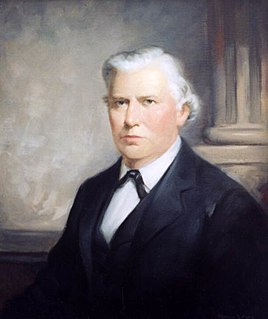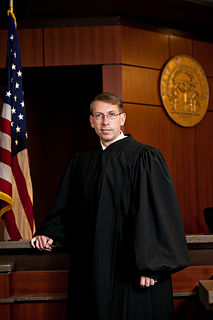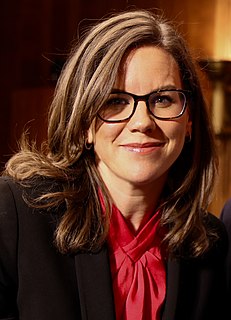Related Research Articles

Sir John Sparrow David Thompson was a Canadian lawyer, judge, and politician who served as the fourth prime minister of Canada, in office from 1892 until his death. He had previously been fifth premier of Nova Scotia for a brief period in 1882.

Larry Dean Thompson is an American lawyer and law professor, most notable for his service as deputy Attorney General of the United States under United States President George W. Bush until August 2003.

Hugh Clowers Thompson Jr. was a United States Army Major, and a former warrant officer in the 123rd Aviation Battalion of the 23rd Infantry Division. He is credited with ending the Mỹ Lai Massacre of the South Vietnamese village known as Sơn Mỹ on March 16, 1968, alongside and hierarchically above Glenn Andreotta and Lawrence Colburn.

Henry Baldwin was an Associate Justice of the Supreme Court of the United States from January 6, 1830, to April 21, 1844.

Melvin Ernest Thompson was an American educator and politician from Millen in the U.S. state of Georgia. Generally known as M.E. Thompson during his political career, he served as the 70th Governor of Georgia from 1947 to 1948 and was elected as the first Lieutenant Governor of Georgia in 1946.
Justice Thompson may refer to:

Leah Ward Sears is an American jurist and former Chief Justice of the Supreme Court of Georgia. Sears was the first African-American female chief justice of a state supreme court in the United States. When she was first appointed as justice in 1992 by Governor Zell Miller, she became the first woman and youngest person to sit on Georgia's Supreme Court.

George Rockingham Gilmer was an American politician. He served two non-consecutive terms as the 34th Governor of Georgia, the first from 1829 to 1831 and the second from 1837 to 1839. He also served multiple terms in the United States House of Representatives.

Mercer University School of Law is the professional law school of Mercer University. Founded in 1873, it is one of the oldest law schools in the United States; the first law school accredited by the bar in Georgia, and the second oldest of Mercer's 12 colleges and schools. The School of Law has approximately 440 students and is located in Macon, Georgia on its own campus one mile (1.6 km) from Mercer's main campus. The law school building, one of Macon's most recognizable sites, is a three-story partial replica of Independence Hall in Philadelphia and is located on Coleman Hill overlooking downtown Macon. According to Mercer's official 2020 ABA-required disclosures, 72% of the Class of 2020 obtained full-time, long-term, JD-required employment nine months after graduation.

In the 2006 Georgia elections, Incumbent Governor Sonny Perdue, the first Republican Governor of Georgia since reconstruction, was re-elected over then-Lieutenant Governor Mark Taylor (D).

Carol Wyckoff Hunstein is an American lawyer and judge from Georgia. She is a former Justice of the Supreme Court of Georgia. She served on the Court as an associate justice from 1992 to 2009 and 2013 to 2018 and as Chief Justice from 2009 to 2013.

The Clariosophic Society, also known as ΜΣΦ, is a literary society founded in 1806 at the University of South Carolina, then known as South Carolina College, as a result of the splitting in two of the Philomathic Society, which had been formed within weeks of the opening of the college in 1805 and included virtually all students. At what was called the Synapian Convention held in February, 1806, the members of Philomathic voted to split into two separate societies, one of which became known as Clariosophic, while the other society became known as Euphradian. Two blood brothers picked the members for the new groups in a manner similar to choosing up sides for an impromptu baseball game. John Goodwin became the first president of Clariosophic. Other early presidents include Stephen Elliott, Hugh S. Legaré. George McDuffie and Richard I. Manning. The Society was reactivated in 2013.
Cox Broadcasting Corp. v. Cohn, 420 U.S. 469 (1975), was a United States Supreme Court case involving freedom of the press publishing public information. The Court held that both a Georgia statute prohibiting the release of a rape victim's name and its common-law privacy action counterpart were unconstitutional. The case was argued on November 11, 1974 and decided on March 3, 1975.

Smith Thompson was a US Secretary of the Navy from 1819 to 1823 and a US Supreme Court Associate Justice from 1823 to his death.

The Marshall Court (1801–1835) issued some of the earliest and most influential opinions by the Supreme Court of the United States on the status of aboriginal title in the United States, several of them written by Chief Justice John Marshall himself. However, without exception, the remarks of the Court on aboriginal title during this period are dicta. Only one indigenous litigant ever appeared before the Marshall Court, and there, Marshall dismissed the case for lack of original jurisdiction.

The three governors controversy was a political crisis in the U.S. state of Georgia from 1946 to 1947. On December 21, 1946, Eugene Talmadge, the governor-elect of Georgia, died before taking office. The state constitution did not specify who would assume the governorship in such a situation, so three men made claims to the governorship: Ellis Arnall, the outgoing governor; Melvin E. Thompson, the lieutenant governor-elect; and Herman Talmadge, Eugene Talmadge's son. Eventually a ruling by the Supreme Court of Georgia settled the matter in favor of Thompson. Georgia's Secretary of State Ben Fortson hid the state seal in his wheelchair so no official business could be conducted until the controversy was settled.

Leslie Atchinson Thompson was a lawyer, author of works on legal subjects, politician, and judge. He was city clerk, treasurer, and mayor of Tallahassee. He also served as an associate justice of the Supreme Court of Florida from 1851 to 1853.

Reuben Green is a former Cobb County Superior Court Judge who was appointed in 2010 and previously lead the Cobb County Veterans Accountability and Treatment Court. Reuben Green was defeated by Angela Brown in the June 2020 election cycle.

The 1946 Georgia gubernatorial election took place on November 5, 1946, in order to elect the Governor of Georgia.

Britt Cagle Grant is an American attorney and judge who is a United States Circuit Judge of the United States Court of Appeals for the Eleventh Circuit. She is a former Justice of the Supreme Court of Georgia.
References
- ↑ "Hugh P. Thompson" . Retrieved August 29, 2013.
- ↑ "Georgia Official and Statistical Register". 1989.